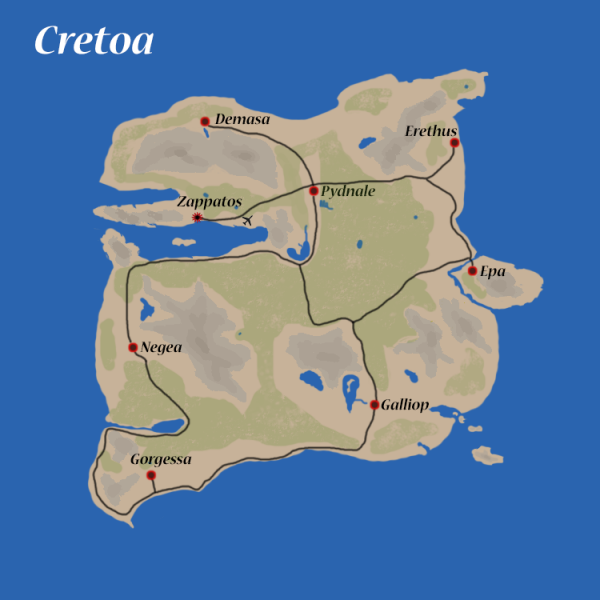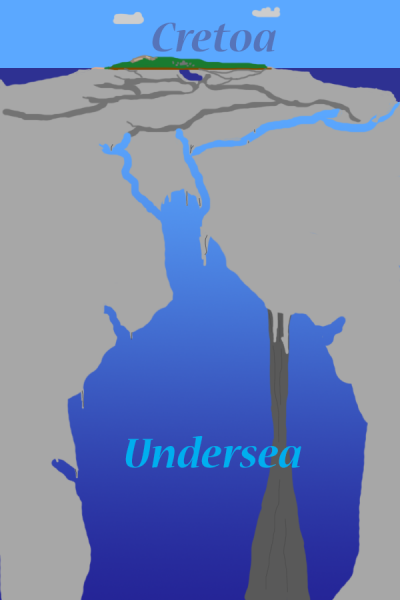Cretoa (Adventurers)
Cretoa is a fictional island nation in the Aegean Sea, used in campaigns of the Adventurers supergroup.
Contents
History
Prehistory
Cretoa is thought to have human habitation since about 3000 BCE. However, evidence of non-human habitation of its subterranean caverns indicates the Nereids have been there considerably longer. Due to the Nereid embargo on surface dweller interactions, it is difficult to accurately estimate their habitation of Cretoa or its Undersea.
Cretoan Facts
Geography
- Cretoa is situated in the Aegean Sea.
- At its longest, from about the southwest tip to the northeast, Cretoa measures 61 Km (37 Miles).
- The capital city is Zappatos, which is home to the Royal Palace and the Cretoan Legislature.
Demographics
Note: the following were supplied in Cretoa's second UNSD filing in early 2023.
- The population of Cretoa is approximately 130,500 people.
- The language breakdown on Cretoa is as follows:
- 99.9% speak Greek
- 22.5% speak Russian
- 15.1% speak Turkish
- 9.9% speak English
Government
Cretoa is a constitutional monarchy. Since about 990 CE, it has been ruled as a principality. Throughout its history, Cretoa survived through paying tribute to larger, more powerful empires - the most recent of which was the Soviet Union. Prince Iason, whose rule began in 1983, closed Cretoa's borders in 1990 as an emergency when the Soviet Union broke up. The state of emergency was never ended, however, and Iason ruled the island as a rigid police state. Once Russia stabilized, it continued to help guarantee Cretoan sovereignty. However, a breakdown in Russian relations in the 2010s has left the island largely closed off to the world.
Following Iason's death in 2017, a brief revolution was tempered by Princess Taina reaching an accord with revolutionary leadership to establish a new constitution and a democratic legislature. This relegated the royalty to ceremonial figurehead status. A general amnesty was declared as a goodwill gesture by the new government toward agents of previous regimes, balanced with police and military reforms to prevent further abuse. The nation has held legislative elections.
Princess Taina is the current head of state. Prime Minister Zedrick is the current government leader.
Economy
Cretoa trades on a miniscule scale, finding it difficult to enter established global markets after decades-long closure to the world following the collapse of the Soviet Union.
Almost the entire wealth of the island comes from a valuable, apparently unique medicinal substance called vitanium, touted for its incredible regenerative capability. Cretoa has permitted sharing of tiny amounts of the substance to a small number of academic institutions for scientific study. However, only the ultra-rich, or those granted access by the royalty, are able to access vitanium therapy. Vitanium generates billions of dollars in revenue, but has led to criticism of the Cretoans for not sharing it more freely.
There remains a black market run by Cretoan fishers who acquire goods in nearby Greece or Turkey, and sell them on the island. The state of smuggling in Cretoa is in flux, however, now that Cretoa has relaxed its isolationist stance, and outside goods flow more freely into the nation.
Apart from maritime industries and medical tourism, Cretoa has a healthy olive cultivation industry, as well as olive oil, cheese, and wine production.
Travel and Tourism
Cretoa has one airport outside of the capital city Zappatos, which was built by Soviet engineers in 1965. There are numerous small fishing ports on the coastline. Even with the government reform in 2018, all entry points are still carefully watched.
Most roads on the island are dirt roads, with the exception of the capital city Zappatos which, thanks to Soviet help, was paved - however, years of neglect has left some of its roads in poor condition. Ever since the new constitution, Cretoa has constructed a two-lane highway between the major cities, and a capital plan has been established to modernize more roadways.
Cretoans are a sea-faring people, with an estimated 48% of Cretoans owning or having access to a motor boat. Numerous independent operators operate tour boats around the island, and a few arrange passenger travel to mainland Turkey or nearby Greek islands.
With international hotel chains such as the Ellison Hotels, and major cruise lines making Cretoa a port of call, there has been development of more tourist-friendly activities. Heritage sites have begun to orient themselves to international travelers, boaters have started scuba, surfing, and snorkeling enterprises. Cities have cultivated better beaches and night clubs.
There is concern from the Cretoan government that outside interests are developing the island's businesses, leaving native Cretoans without ownership or expertise in contemporary business. To that end, bills have been enacted which incentivize international owners who employ and train Cretoans up to the management level, and even more generous incentives to Cretoan-owned enterprises in tourism and hospitality.
Education
The reformed government in 2018 pledged to increase education on the island. As of 2023, Cretoa has established a K-12 educational system with public schools in every major town and city. Rural catchment of students is developing, noting the challenge of acquiring school buses, and trained drivers.
Students learn primarily in Greek language. At the urging of the crown, schools offer international language programming at all levels, particularly Turkish, English, Russian, and Arabic.
The Royal Cretoan Military Academy, and the Royal Cretoan Center for Healing, were traditionally the only higher learning institutions. Starting in 2020, the University of the Aegean in Greece provides academic staff for a new Cretoan campus, which will eventually become an independent, Cretoan-run university by 2035. This will depend on factors such as the availability of native Cretoans to hold academic posts, but also the percentage of Cretoans with a degree.
Less than 0.001% of Cretoans - generally the noble class - have studied abroad.
During the monarchy era, internet was strictly controlled and limited to the royal family and their inner circle. Presently, Cretoa is expanding public internet infrastructure. A 2022 survey suggests that about 3 in 5 Cretoans have access to the internet. The majority of Cretoans access internet through their mobile phone.

